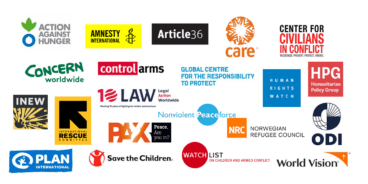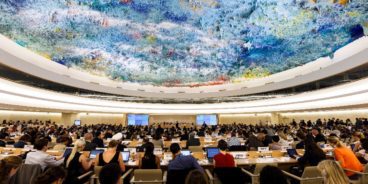
Joint NGO Letter to UN Security Council Members on the Situation in Burundi
(New York)
Dear Ambassador,
We, the undersigned international and Burundian non-governmental organizations, write to urge the UN Security Council to impose targeted sanctions against individuals responsible for ongoing serious human rights violations in Burundi. Such measures, including travel bans and asset freezes, would send an important message to Burundian leaders who have faced little consequence for continuing to perpetrate gross abuses against their own people.
While the Burundian authorities have released some prisoners, they have continued their broader policy of repression against suspected opponents, independent civil society, and media, and they have deliberately obstructed the ability of the UN to document rights violations. Police and members of the youth league of the ruling party, the Imbonerakure, continue to commit abuses with impunity. Imbonerakure members have killed, tortured, raped, and severely beaten scores of people across the country, including Burundians fleeing to Tanzanian refugee camps. In addition, on January 23, the government enacted a new law on international nongovernmental organizations. It places restrictions on freedom of expression, association, and assembly and provides new and sweeping powers to the government to control international nongovernmental organizations and repress critical voices.
Following a damning report by the UN Independent Investigation in Burundi released in September 2016 and detailing gross and systematic human rights violations, Burundian authorities suspended all cooperation with the Office of the UN High Commissioner for Human Rights in Burundi and declared the three UN independent experts who authored the report persona non grata. A UN Commission of Inquiry was authorized by the Human Rights Council but denied access to the country. More recently, UN staff have had difficulty obtaining visas, securing meetings with key government officials, and operating in the country. Burundian authorities also continue to refuse the deployment of 228 unarmed police, as mandated by the Security Council last July.
The African Union authorized the deployment of 100 human rights observers and 100 military observers, but only a small number have been deployed because of disagreements between the Burundian government and the AU. The AU human rights observers based in Bujumbura have been unable to work unhindered in the country.
The government’s obstruction of the UN’s ability to document and mitigate violations should compel members of the Security Council to take strong action. A Security Council-mandated panel of experts could help identify officials, whether in government or the opposition, most responsible for ongoing summary executions, torture, and other serious human rights abuses. It would be important to ensure that such sanctions are targeted at those responsible for ongoing abuses, make it clear what they need to do to end the sanctions against them and give all affected directly by such sanctions strong due process rights in being able to challenge the sanctions.
Targeted individual sanctions should have no negative effect on the broader Burundian population, but could send an important signal to decision-makers that continued human rights violations will come at a price. If Security Council members allow Burundian officials to continue to abuse their people and openly flaunt their disregard for the Council’s decisions without consequences, they will feel emboldened and other countries may take notice.
We are available to discuss this issue further with you and your experts.
Sincerely,
- Action des Chrétiens pour l’Abolition de la Torture au Burundi (ACAT Burundi)
- Association Burundaise pour la Protection des Droits Humains et des Personnes Détenues (APRODH)
- Atrocities Watch – Africa
- Coalition de la Société Civile pour le Monitoring Électoral (COSOME)
- Fédération Internationale de l’Action des Chrétiens pour l’Abolition de la Torture (FIACAT)
- Forum pour la Conscience et le Développement (FOCODE)
- Forum pour le Renforcement de la Société Civile (FORSC)
- Global Centre for the Responsibility to Protect
- Human Rights Watch
- International Federation for Human Rights (FIDH)
- Mouvement Citoyen pour l’Avenir du Burundi (MCA Burundi)
- Partnership for Justice
- Refugees International
- Reporters Without Borders
- Réseau des Citoyens Probes (RCP)
- SOS-Torture
- Ökumenisches Netz Zentralafrika (ÖNZ)
- Organisation pour la Transparence et la Gouvernance (OTRAG Burundi)
- World Organisation Against Torture (OMCT)
Related Publications


Joint recommendations for the Universal Periodic Review of Yemen
